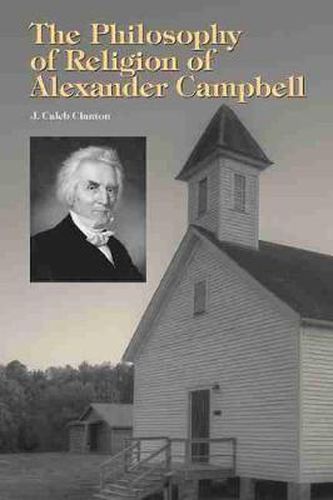Readings Newsletter
Become a Readings Member to make your shopping experience even easier.
Sign in or sign up for free!
You’re not far away from qualifying for FREE standard shipping within Australia
You’ve qualified for FREE standard shipping within Australia
The cart is loading…






Well known for the important role he played in the American Restoration Movement, Alexander Campbell was one of the most respected and influential religious figures of 19th-century America. Although Campbell’s legacy as a religious leader and theologian has been widely acknowledged and documented, his contributions as a philosopher of religion have been largely neglected.
The Philosophy of Religion of Alexander Campbell reintroduces readers to Campbell as a philosopher of religion and explores the philosophical basis for the views underlying his religious movement. It begins with a highly readable discussion of Campbell’s role in antebellum American religion and proceeds to an exploration of his philosophical influences. J. Caleb Clanton then reconstructs, explains, and evaluates Campbell’s philosophy of religion. He critically examines Campbell’s unique, revealed-idea argument for the existence of God-that is, if God did not exist, we could not form the distinct idea of God. Clanton goes on to explore Campbell’s defence of miracles, including the resurrection of Christ, and his responses to the problem of evil and the problem of divine hiddenness. The final and most speculative chapter collects and synthesises from scattered writings Campbell’s view on morality and religion- namely that there is no morality without God-which has proven difficult to defend on philosophical grounds.
With this book, the author makes a unique and important contribution to the literature of the Stone-Campbell movement. Clanton presents Campbell’s views strictly in philosophical terms and evaluates them from a philosophical perspective without regard to religious apologetics. In doing so, he illuminates previously unexplored dimensions of Campbell and his work, both historically and theologically, and clearly validates Campbell’s inclusion in contemporary discussions of the philosophy of religion.
$9.00 standard shipping within Australia
FREE standard shipping within Australia for orders over $100.00
Express & International shipping calculated at checkout
Well known for the important role he played in the American Restoration Movement, Alexander Campbell was one of the most respected and influential religious figures of 19th-century America. Although Campbell’s legacy as a religious leader and theologian has been widely acknowledged and documented, his contributions as a philosopher of religion have been largely neglected.
The Philosophy of Religion of Alexander Campbell reintroduces readers to Campbell as a philosopher of religion and explores the philosophical basis for the views underlying his religious movement. It begins with a highly readable discussion of Campbell’s role in antebellum American religion and proceeds to an exploration of his philosophical influences. J. Caleb Clanton then reconstructs, explains, and evaluates Campbell’s philosophy of religion. He critically examines Campbell’s unique, revealed-idea argument for the existence of God-that is, if God did not exist, we could not form the distinct idea of God. Clanton goes on to explore Campbell’s defence of miracles, including the resurrection of Christ, and his responses to the problem of evil and the problem of divine hiddenness. The final and most speculative chapter collects and synthesises from scattered writings Campbell’s view on morality and religion- namely that there is no morality without God-which has proven difficult to defend on philosophical grounds.
With this book, the author makes a unique and important contribution to the literature of the Stone-Campbell movement. Clanton presents Campbell’s views strictly in philosophical terms and evaluates them from a philosophical perspective without regard to religious apologetics. In doing so, he illuminates previously unexplored dimensions of Campbell and his work, both historically and theologically, and clearly validates Campbell’s inclusion in contemporary discussions of the philosophy of religion.